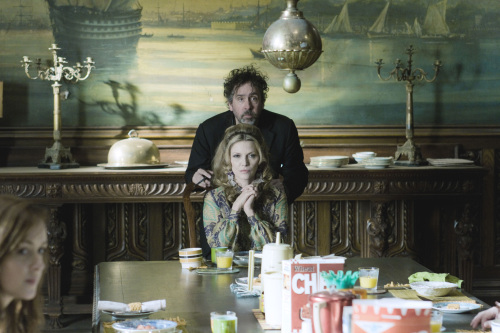There’s one thing everyone will be able to agree on regarding Tim Burton’s cinematic reimagining of the old TV series “Dark Shadows”: This isn’t your mother’s gothic soap opera.
The original, which ran from 1966 to 1971, smashed the daytime-TV mold by introducing cool supernatural storylines into the usual heat of love triangles and broken hearts. Long before staid afternoon dramas like “General Hospital,” in order to attract young viewers, juiced up their storylines with fantastical elements, and newcomers like “Passions” sported a town witch, “Dark Shadows” lured the after-school crowd with a manic mix of magic and melodrama.
To top it off, well in advance of Anne Rice and “True Blood,” “Dark Shadows” made vampires hip and sexy.

Director Tim Burton and Michelle Pfeiffer appear on the set during the production of “Dark Shadows” from Warner Bros. Pictures and Village Roadshow Pictures. (MCT)
So, it’s no wonder that a high priest of pop culture like director Burton would be intrigued enough to craft an update. But fans of the series may be disappointed. While the show was often inadvertently humorous (largely because it seemed to have a budget of about $1.50), the intent ― in its story of the rich but haunted and trouble-plagued Collins family ― was to be some blend of “Dracula” and “Wuthering Heights.”
Burton has jettisoned much of that for a loving but jokey, fish-out-of-water reboot, turning “Dark Shadows” into a sometimes funny sendup that devolves into the usual special-effects overload in the final act.
Johnny Depp is Barnabas Collins, an 18th century vampire in Maine who has been cursed by the witch Angelique (Eva Green) to spend eternity buried alive in a coffin. In 1972, excavators open the coffin, releasing Barnabas ― who must adjust to a) what his down-on-their-luck family (featuring Michelle Pfeiffer as matriarch Elizabeth Collins) and their decaying Collinwood estate have become and b) life in the ’70s.
There are moments of brilliance, as when Barnabas gets Alice Cooper, at the request of spacey, 15-year-old hipster Carolyn Collins (Chloe Grace Moretz), to entertain at a Collinwood bash. (Though, oddly, while much of the music on the soundtrack will make ’70s pop fans giddy, nitpickers will note that some of it ― such as Barry White’s 1974-released “You’re My First, My Last, My Everything” ― would not have been heard in ’72).
The heart of the movie belongs to Barnabas’ ongoing battle against Angelique (yes, who’s still alive), and his long-running love for his beautiful Josette, who seems to have been reincarnated in the Collins’ family tutor, Victoria Winters (Bella Heathcote).
Diehard fans of the series will be appalled that there’s not even a mention of brooding Quentin Collins ― the Heathcliff of Collinwood ― who was such an integral part of the original show. (David Selby, who played Quentin, does make a very brief appearance, as does the late Jonathan Frid, who played Barnabas). They may not be happy, either, that Barnabas’ self-serious confidante Dr. Julia Hoffman (Helena Bonham Carter) has been turned into a drunk.
But Depp portrays Barnabas with ample but not over-the-top comedic charm, and Burton keeps his touch light, not overwhelming things with his trademarked frenetic style, at least at first. By the end nearly two hours later, as the war between Barnabas and Angelique heats up, “Dark Shadows” becomes more ploddingly predictable. Surprise, surprise ― they even leave the door open for a sequel.
Still, it remains to be seen if this mix-and-match of filmic elements can lure longtime fans, for whom the shadows won’t be dark enough, and younger viewers, who wouldn’t know Collinwood from Dollywood. While this certainly may not be your parents’ gothic soap opera, it may not be your childrens’ either.
By Cary Darling
(McClatchy Newspapers)
(MCT Information Services)






